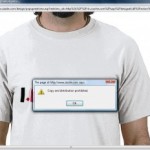I have this seeking suspicion that no one on this fucking internet knows how to use Wikipedia. So let me explain this to you people in few easy to understand points:
- Wikipedia is not a “source” – it is a “resource”
You know what is the only useful part of a wikipedia article? It’s the references section. There you can find links to credible sources, ISBN numbers of relevant books, and etc.. Wikipedia is a good place to start your research, or find out useless trivia that you don’t really care to verify.
- Wikipedia is not broken
If you find a wikipedia article that is blatantly wrong, or that consist of the “Fresh Prince of Bel Air” lyrics (and trust me, every Wikipedia article at some point does) it does not mean Wikipedia is broken. You don’t have to write a long blog post about dangers of wikipedia, wikipedia credibility and etc.. Complaining about wikipedia being inaccurate is like complaining that water is wet, that slashdot has dupes, or that there is porn on the internets. If you do it, you just end up looking like an idiot.
If the article is wrong, don’t whine about it. Fix it.
- If you want to chronicle Wikipedia vandalism link to the history page
I can’t tell you how many times I saw blog posts that link to a wikipedia article with something like “OMG, this is so funny!”. But when you actually click on the link you get taken to perfectly normal article. Remember, vandalism and controversial shit has a very short lifespan and will usually get yanked within hours if not minutes from posting.
- Wikipedia is Wiki first and Encyclopedia second
Next time feel an urge to compare Wikipedia to an actual encyclopedia, don’t. It is not really an encyclopedia. It is a community project in collecting and cataloging encyclopedic data. Keep that in mind at all times and see #1 and #2 on this list.
Hopefully this will clear up any confusion out there. Feel free to add your own points in the comments, or disagree with mine.
[tags]wiki, wikipedia, encyclopedia, research, knowledge, encyclopedic[/tags]





*insert big fat ditto here*
Wikipedia has become a major resource for me lately. When even I am searching for something obscure, Wikipedia is sure to be the first hit. You also find information not in regular encyclopedias, like all the Doctor Who information. Who knew that the Doctor made an appearance on the Simpsons? Wikipedia did!
It is also a great time waster. You look up one thing, and then you just click on some links on the page to look up related stuff. Then you look up stuff from those related pages.
I wasted many hours of my life just reading wikipedia articles on really random and obscure stuff. :P
I one up’d Craig and made a nice Ditto POST here.
Point number one is essentially correct, except for the fact that the people running Wikipedia are working assiduously to eliminate all external links. So eventually, Wikipedia will no longer be a useful collection of links to sources.
Point number two I’ve heard before from Wiki=boosters who believe that mindlessly repeating the holy mantra of Wikipedia (“anyone can edit it… anyone can edit it… anyone can edit it… “) somehow makes everything OK. I’m afraid their self-righteous assumption that I have a moral obligation to edit crappy, inaccurate, and often un-parsable writing is not just wrong, but offensive.
The truth is that Wiki-boosters, like yourself apparently, want it both ways: saying both “Wikipedia isn’t authoritative” (this is a euphemism for “Wikipedia articles are often wrong”) and yet arguing that “Wikipedia is a collection of encyclopedic information” (which is a euphemism for “Trust this site’s content.”)
Unfortunately for the Wikipedia community, you can’t have it both ways: either the Wikipedia contains correct information in a useful form, which means it is accurate and thus “authoritative,” or it does not, in which case it is a pile of steaming trivia. Until some accountability is engineered into the system, it will cannot move beyond that stage.
[quote post=”1500″]except for the fact that the people running Wikipedia are working assiduously to eliminate all external links.[/quote]
I haven’t noticed that. I did notice however many notes like “citation needed” on many pages, suggesting that editors do care about providing references. If you are right about this, then it is a unfortunate trend.
[quote post=”1500″]I have a moral obligation to edit crappy, inaccurate, and often un-parsable writing is not just wrong, but offensive.[/quote]
No moral obligation. No obligation whatsoever. If you don’t care, you can just move on. If you do care, you can edit, or report vandalism on relevant talk pages.
Complaining about this problem on blogs and message boards is silly, because Wikipedia has built in mechanisms that let you take direct action to fix it.
[quote post=”1500″]saying both “Wikipedia isn’t authoritative” (this is a euphemism for “Wikipedia articles are often wrong”) and yet arguing that “Wikipedia is a collection of encyclopedic information” (which is a euphemism for “Trust this site’s content.”)[/quote]
Nope. I never said one or the other. Wikipedia is a collection of user contributed articles. It is an approximation of an encyclopedia, and should never be cited as an authoritative source.
However Wikipedia is useful because:
1. more often than not contains accurate and verifiable information
2. it is free (most encyclopedias aren’t)
3. it is easily searchable (indexed by google in it’s entirety)
4. updated in real time
Your points are exactly what I’m talking about here – people get hung up on semantics and definition of what is and is not encyclopedic content.
Wikipedia is not Britanica or Encarta. It never was, and it never will be – by design.